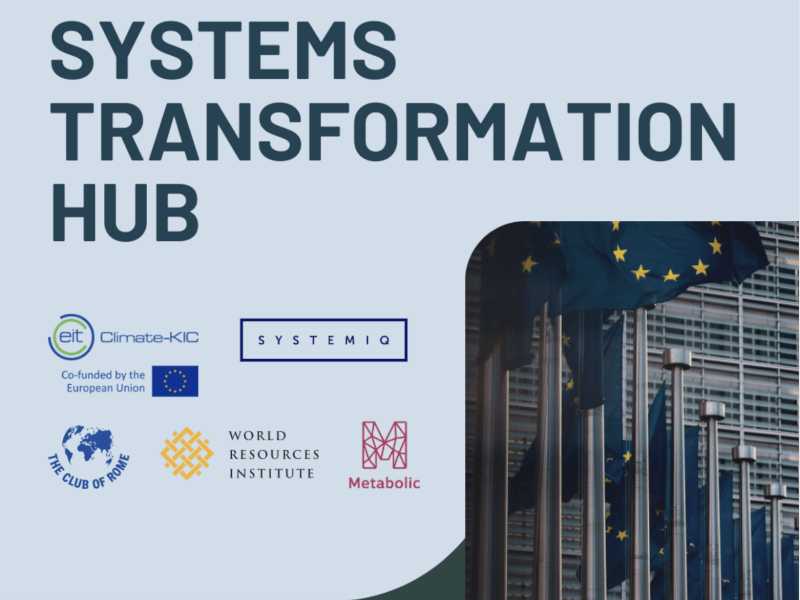26 September 2022 – The world has faced an unprecedented threat from interconnected tipping points on climate change, health, biodiversity loss, poverty and inequitable human development patterns which are creating the greatest existential risk to humanity.
This is a key moment to address the planetary emergency and system failures. It is the decade of action. 50 years since the UN Conference on the Human Environment, the publication of The Limits to Growth report and 30 years after the United Nations Conference on Environment and Development, the Stockholm+50 Conference was a critical moment for decision makers to signal their readiness to stand by existing commitments and ensure their immediate and accelerated implementation to preserve our collective future. We do not have another 50 years. To avoid system collapse and extinction, we must move from words to action and shift towards net-zero, nature-positive and equitable societies today.
The war in Ukraine, the economic crisis in Sri Lanka, the food crisis in West Africa, the lingering effects of Covid, 1 million species at risk of extinction, extreme temperatures and increasingly irreversible ecosystem losses are just the tip of the iceberg and clear signs that we need to change course quickly. Global wellbeing is declining, social tension is increasing and the dynamic relationship they hold with the planetary emergency means solving one without the other only serves to undermine both. In the face of multiple interlinked crises, the last two years saw enhanced collective global action and bigger and bolder promises from governments. Unfortunately, in 2022 implementation is halting – we are not on track. Hence, we, the undersigned government leaders and other non-state actors and right holders, are sending a final notice to governments to follow up on their commitments and move from words to action to fix the broken state of our planet.
We need to urgently ramp up coordinated and systemic actions with clear targets, timetables and plans for monitoring and implementation. We urge all governments, businesses and financial institutions to make good on previously-made promises by matching policy targets and financial commitments with credible short and long-term plans and strengthen their shared efforts to:
- Develop strong monitoring and review mechanisms to ensure the efficiency, transparency and accountability in the use of existing resources – including the creation of a high- level, action-oriented forum (akin to the Clean Energy Ministerial) to maintain high-level political focus on existing commitments.
- Conserve forests, wetlands and other terrestrial ecosystems as well as the global ocean and accelerate their restoration by 2030, in line with the Global Leaders Declaration on Forests and Land-use and existing 30×30 commitments;
- Transform the current unsustainable patterns of consumption and production into sustainable ones to meet people’s need while remaining well within the limits of the planetary boundaries – including halving the global consumption and production footprint and adopting new economic indicators for redefining economic goals to deliver greater wellbeing within planetary boundaries by 2030.
- Align financial flows with international goals to reverse forest loss, shift to regenerative landuse and accelerate greenhouse emission reductions in line with a 1.5°C trajectory by 2030, including eliminating or repurposing perverse agricultural, fisheries and fossil fuel subsidies.
- Ensure a whole-of-society approach in key decisions based on rights by promoting radical collaboration and fostering sustainable partnerships, with the inclusion and meaningful participation of Indigenous Peoples and local communities, women and girls, youth and marginalised communities to enhance resilience and reduce vulnerability.
What we are asking for is not new. This call to action builds on existing commitments:
- In 2020, Heads of State and Government from 93 countries endorsed the “Leaders’ Pledge for Nature”, which committed to reversing biodiversity loss by 2030 for sustainable development through clear systemic shifts; this ambition was reconfirmed during a high-level Biodiversity Pre-COP event hosted by Colombia last year and the need for a nature-positive economy similarly affirmed in the Leaders Pledge for Nature progress report.
- Over 96 countries have joined the High Ambition Coalition for Nature and People, co-chaired by Costa Rica and France, to raise global ambition to achieve at least 30% protection of the land and ocean by 2030 at the UNCBD COP15;
- 72 countries are part of the Global Ocean Alliance, led by the United Kingdom, and support the 30% marine target at the UNCBD COP15;
- The High Ambition for Climate, brought together by the Republic of the Marshall Islands, represents over 100 countries, and calls for greenhouse emission reductions in line with a 1.5°C trajectory as soon as possible and in time for consideration by the leaders at the global stocktake in 2023;
- Current “50×30” consistent governments include Denmark, Finland, Germany, Sweden and COP-26 host the United Kingdom. Finland and the UK have both endorsed the 50×30 Mission Statement last year;
- The “Global Leaders Declaration on Forests and Land-use” calls for halting and reversing deforestation and land degradation by 2030 and was endorsed by 141 countries, representing 90% of the Earth’s remaining forests, during UNFCCC COP26.
These commitments and declarations are sending clear signals for profound transformation, in line with the level of ambition set out in the Planetary Emergency Plan, supported by a network of 350 Partners representing leading non-governmental organisations across the biodiversity, climate and health spheres.
Yet, declarations alone are not enough: Resource mobilisation continues to lag behind calls to action and the global funding raised for biodiversity amounts to 12% of the total funds required, whilst investments harming our natural world keep exacerbating the crisis – not to mention the failure to deliver on the 100 billion dollars climate finance commitment to developing and least developed countries. Strong political will for immediate economic transformation, finance for transition to a nature-positive, net-zero economy for an equitable world, and monitoring and review mechanisms to back up commitments are insufficient or absent. They are needed now, and not after the next crisis. We have less than 8 years to deliver on the SDGs and we must act now with coordinated efforts.
This is our call to make it happen as the health of our planet is not negotiable and delay in action is not forgivable if we are to secure all life on Earth now and for future generations. Not another call to action, but a re-call to translate existing commitments to clear and ambitious targets, timetables and immediate and successful implementation. All leaders at Stockholm +50 must implement transformational economic policy today that will correct the current systems failure and deliver nothing short of the targets above. Together, these targets will catalyse the shift towards more resilient people, planet and prosperity. We have the knowledge, human capacity and financial capital for success – now we need brave leadership to make systems change happen.






